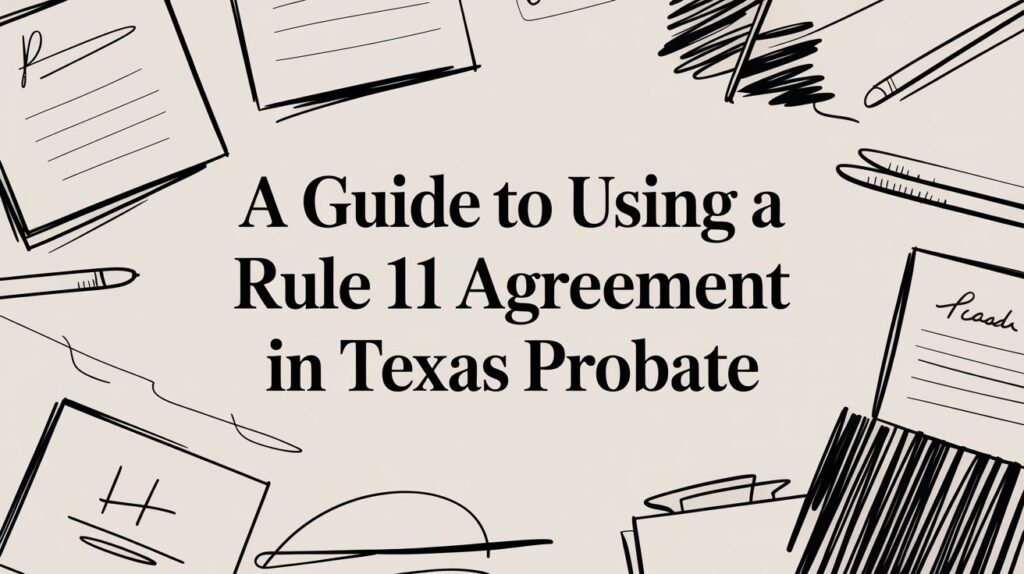Medicaid Estate Recovery, or MERP, allows states to collect costs from a deceased Medicaid recipient’s estate. The program focuses on certain Medicaid benefits provided to individuals aged 55 and older. It can significantly affect how assets pass through probate. In Texas, MERP is enforced by the Health and Human Services Commission. Many families discover these recovery efforts when a loved one’s estate enters probate. This article examines how MERP impacts probate processes for Texas residents. It explores ways to protect assets while following Medicaid rules. Understanding these nuances can help families prevent unexpected financial burdens. Many people rely on Medicaid without realizing potential estate recovery consequences. The interplay of MERP and probate can be complex. Comprehensive knowledge is essential for anyone involved in Texas probate proceedings. Families should prepare carefully to reduce the chance of significant asset losses.
The Origins and Legal Basis of Medicaid Estate Recovery

Federal law requires states to pursue reimbursement for certain Medicaid expenditures from deceased recipients’ estates. This mandate arises primarily from the Omnibus Budget Reconciliation Act of 1993, commonly known as OBRA ’93. Each state develops its own procedures, but the overall goal remains consistent. Texas implements Medicaid Estate Recovery through the Health and Human Services Commission. The commission seeks reimbursement for long-term care and related services provided to eligible beneficiaries aged 55 or older. MERP enforces federal guidelines that address who must repay these costs and under what circumstances.
Many beneficiaries and heirs remain unaware of these rules until probate proceedings begin. Families might assume Medicaid coverage is free, but estate recovery often introduces substantial repayment obligations. States do have some discretion, leading to differences in the enforcement of MERP across the country. Still, Texas follows federal mandates closely, especially for nursing home care and certain in-home services. Awareness of these requirements is vital for estate planning and probate preparation. Proactive strategies can prevent unwelcome surprises and help families safeguard essential assets. Though MERP can seem harsh, it reflects the broader intent of limiting public expenditures.
Medicaid Estate Recovery in Texas: Key Provisions
The Texas MERP program applies to individuals who received specific Medicaid services after turning 55. Such services often include nursing facility care, in-home support, and other long-term care benefits. Once the recipient dies, the state may file a claim against assets passing through probate. Non-probate transfers often remain exempt from recovery, providing opportunities for strategic asset organization. Texas MERP prioritizes cost-effective claims, particularly when substantial estate assets are available. If the estate lacks meaningful resources, the state may decline to pursue recovery. Heirs typically receive a Notice of Intent, explaining the claim’s basis and total estimated amount. They must address that notice within specified deadlines to avoid losing potential defenses.
Any valid MERP claim stands alongside other creditors in the probate process. Executors must assess these debts and distribute remaining property accordingly. MERP can overshadow other liabilities, especially when the claim covers extensive long-term care costs. Families often discover their primary residence is at risk due to accrued Medicaid expenses. A thorough understanding of MERP rules helps families navigate this intricate recovery framework.
How MERP Interacts with Texas Probate Proceedings
Probate in Texas involves settling a decedent’s outstanding obligations and distributing remaining assets to heirs or beneficiaries. When Medicaid Estate Recovery applies, the state effectively becomes a creditor with priority considerations. The executor or administrator must notify the state and handle any MERP claim before final distribution. Property subject to probate may be sold if necessary, providing funds to satisfy the MERP claim. This process can generate unexpected financial burdens for heirs who expected to inherit a home or other valuables. Certain homestead protections exist, but these may not always override a MERP claim.

If a surviving spouse or dependent child remains, MERP might delay or forgo recovery. Heirs should confirm the presence of any exemptions or hardship waivers that might apply. Legitimate creditor claims must generally be resolved, ensuring compliance with Texas probate statutes. Executors carry personal liability if they distribute assets prematurely without settling valid claims. Hence, MERP considerations significantly shape the timeline and outcome of probate proceedings.
Exemptions and Hardship Waivers
Texas law offers certain exceptions that can shield assets from MERP claims. A surviving spouse generally precludes active recovery during their lifetime. Children under 21, or those with disabilities, may also trigger exemption from estate recovery. Additionally, families can request an undue hardship waiver under specific circumstances. A family farm or ranch might qualify if its sale would create severe economic disruption. Filing for a waiver requires prompt action and thorough documentation. The state reviews each request, determining if equity and public interest factors justify leniency. Approved waivers can reduce or entirely eliminate the amount owed. Careful preparation strengthens the case for a hardship exemption. Exemptions and waivers remain essential tools to protect critical family assets from forced liquidation.
Strategies for Minimizing MERP Impacts
Proper planning before applying for Medicaid can alleviate many estate recovery concerns. Irrevocable trusts may remove assets from the probate estate, but timing is critical. Lady Bird Deeds, or enhanced life estate deeds, allow direct transfer to heirs outside probate. Joint tenancy with right of survivorship can also bypass probate under certain conditions. However, each approach has potential pitfalls, particularly regarding Medicaid’s look-back period and eligibility rules. Consultation with an elder law attorney can help families select suitable asset protection methods. Estate planning must balance the need for Medicaid coverage with the goal of preserving inheritance rights. Approaches vary depending on family structure, asset composition, and projected care costs. Ongoing legal guidance can address changes in legislation and personal circumstances.
Potential Pitfalls and Common Misconceptions
Many assume Medicaid coverage is entirely free, overlooking the potential for post-death recovery efforts. Some families try last-minute asset transfers, risking penalties and disqualification under the look-back rules. Ignoring MERP notices can forfeit valid defenses or hardship claims. Another misconception involves the scope of recovery, which generally targets only probate assets. Non-probate items usually escape MERP, though misunderstandings can lead to confusion about that distinction. Certain beneficiaries believe the family homestead is always immune, but MERP can still attach if exemptions don’t apply. Valid creditor claims, including MERP, complicate probate timelines and distribution strategies. Estate disputes sometimes arise among family members, particularly when the property holds sentimental or financial significance. Gathering accurate data about Medicaid expenditures is crucial for challenging or verifying the claim.
The Role of Legal Counsel in Navigating MERP and Probate
Legal expertise often proves invaluable when probate and Medicaid Estate Recovery intersect. Attorneys can examine the total claimed amount and identify possible exemptions or hardship pathways. They clarify the timing for responding to MERP notices and represent the estate’s interests in court proceedings. Family members benefit from advice on restructuring assets to minimize or avoid future liabilities. Coordinating with financial planners helps ensure Medicaid eligibility remains intact while limiting exposure to estate recovery.
Lawyers also resolve disputes among heirs regarding property distributions and the validity of MERP claims. Without professional guidance, families risk overlooking important deadlines and procedures. In some cases, partial settlements or negotiations with the state can reduce recovery demands. Long-term planning can produce tangible savings, especially for those anticipating high long-term care costs. An experienced counsel ensures compliance with Texas probate laws while protecting family interests.
Conclusion
Medicaid Estate Recovery influences the inheritance process for many Texas families dealing with probate proceedings. MERP allows the state to recoup costs for long-term care services, targeting assets that pass through probate. These rules can surprise heirs who assumed Medicaid benefits carried no lingering financial obligations. Exemptions, hardship waivers, and strategic planning often help preserve property for spouses or disabled dependents. Asset arrangements like Lady Bird Deeds or irrevocable trusts can also bypass probate and thwart MERP claims. However, each tactic must align with Medicaid’s eligibility framework and look-back periods. Legal counsel provides clarity, verifying the claim amount and identifying potential defenses or settlements.
Failing to address MERP concerns might result in the forced sale of cherished family property. Families benefit most by consulting experts well before a loved one requires Medicaid for long-term care. By understanding MERP and planning effectively, Texans can reduce the financial burden on estates during probate. Such knowledge helps ensure that healthcare support does not unduly hinder the passing of assets to future generations.








